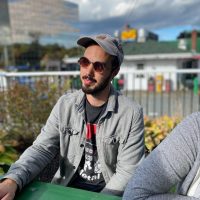
Wesley Petite
democratic antinomies in Canada, structural barriers to public participation within the institutions of representative democracy.
| Email: | wpetite@gmail.com |
Before beginning your studies at the Institute of Political Economy where did you study and what program(s) were you enrolled in?
Before attending the Institute of Political Economy, I was enrolled in a collaborative undergraduate program at University of King’s College and Dalhousie University in Halifax, Nova Scotia. I completed an honours thesis as part of my Political Science major, and my minor in Business provided me with a background in economics. My honours thesis focused on how the Arab Spring decisively dispelled common misconceptions of Islamic communities and power.
What is it specifically that attracted you to study Political Economy at Carleton?
I was really unsure of where I wanted to go with my research next. I knew I wanted to further develop my own critical consciousness and theoretical literacy in order to better understand and pursue a more just and equitable world. I explained this desire to an academic mentor (Dr. Margaret Denike) and they suggested I check out the Institute. I was interested in continuing my research on efforts to democratize and dismantle frameworks of oppression and found that the Institute of Political Economy would be a perfect place to do so. Having enjoyed my MA, I was very happy that I was able to take advantage of the collaborative PhD program between the Institute of Political Economy and the Department of Political Science for my doctoral research.
My areas of research interest include…
I refocused my research on democratic antinomies in Canada, specifically on structural barriers to public participation within the institutions of representative democracy. My MA and PhD research focused on experimentation with participatory budgeting and how the democratizing capacity of these initiatives is structurally inhibited by constructions of knowledge underlying government policy. These constructions of knowledge, largely based around expert perspectives and growth-oriented urban planning strategies, deprived participating residents of an authentic opportunity to allocate government funding on the basis of their experiential knowledge of needs in their community. I have continued to develop my research on the political economy of Canadian cities and opportunities for local government to be a key site for the democratization of democracy.
What activities have you been involved in lately? (work placement, work experience, Undergraduate research, research positions, volunteer work, awards, travel, favourite books)
While finishing my dissertation, I moved back to my hometown of Halifax and got a job as Municipal Food Policy Coordinator at the Ecology Action Centre. I have also been employed as a labour organizer with the Public Service Alliance of Canada, helping grant-paid employees of Dalhousie University who are trying to form a union. I have also enjoyed helping out at Dalhousie University as a Research Assistant for the Law, Justice, and Society Program, coordinated by Dr. Margaret Denike. Most recently, I have joined a project investigating the relationship between effective immunization strategies and public trust as a Postdoctoral Fellow at the Health Law Institute. I am eager to get back into a course instructor position because I love taking part in collaborative and educational processes.
What advice would you give to a prospective Political Economy graduate student?
Political economy can be roughly defined as: the formations of power that influence the allocation of resources and value. Think about a significant change in formations of power and the allocation of resources that you see happening, or want to see happening, in the world. After thinking this through, you’ll have already begun to develop a research project that would fit nicely at the Institute.